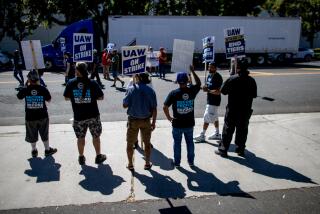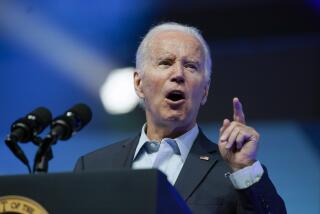Gore Taps a Nerve on Health Care : Education: Teachers union convention applauds vice president’s call for universal coverage. The high cost of insurance has been a prominent issue at the convention.
- Share via
ANAHEIM — Vice President Al Gore ran through a laundry list of hot-button ‘90s issues--family, the economy, school violence--in a speech to the nation’s second-largest teachers union Sunday, but he scored best with the delegates with his call for universal health care.
Stumping for the help of the American Federation of Teachers, the vice president told delegates: “The poor in this country have many problems, but they have health care. The wealthy in this country have health care. Middle-class Americans in this country are at risk of losing their health care.”
His mention of Senate Republican Leader Robert Dole elicited a prolonged hiss from the audience. Gore told the teachers that the Kansas Republican “thinks it is unfair and unsportsmanlike to point out that every Republican senator who opposes universal health care reform already has health care coverage.”
The high price of health care has been a prominent issue at the union convention, as delegates debate the burgeoning costs both for themselves and for their students--many of whom lack coverage of any kind.
Later this week, the union’s 4,000-plus delegates will consider a resolution calling for union backing of a health care reform plan that would guarantee coverage for all Americans and require employers to contribute to the cost. The union leadership has already urged delegates to use boxes outside the convention hall doors to drop off letters asking Congress to approve universal health care.
After Gore’s speech, health care still held the teachers’ attention. Many delegates sounded torn between their fear about what universal health care would cost them--union contracts already guarantee health care for virtually all members--and their concern for their students, many of whom cannot afford to see a doctor.
“Over the past 2 1/2 years of negotiating, I have seen the cost of health care escalate 150% for one of the (insurers),” said Maya Decker, president of the Newport Mesa Unified School District Federation of Teachers. “It makes hanging on to some kind of health care tougher and tougher each year.”
It’s also made life tougher on the students, said Monroe Morgan, a business teacher from Chicago. Today’s teachers know that many of their students are not getting proper care in areas ranging from eyeglasses to more serious medical problems, he said.
“Many times I’ve talked to parents and they say, ‘We’re going to take him to the doctor,’ ” he said. “But, of course, they don’t have the money or the health coverage.”
In his 45-minute speech, Gore spoke of a “family friendly” executive order signed July 11 by President Clinton. It presses federal agencies to make the workplace more supportive of families by allowing job-sharing, flexible work schedules, telecommuting and the like.
“We want to set a standard in the federal government that can spread throughout the American workplace, a standard that keeps families together instead of driving them apart,” Gore said.
The vice president also talked up his pet issue--access to the so-called information superhighway.
“More than three-quarters of our children don’t even have an information footpath going to the classroom,” Gore said.
Only 22% of the nation’s classrooms have telephone lines that could link classroom computers to outside on-line services, and only 4% have modems, Gore said. He asked teachers to support legislation that would connect every U.S. classroom by computer to a national information infrastructure by the year 2000.
The legislation, Gore said, would ensure that the “students in Watts have access, not just students in Brentwood.”
For many of these teachers, the need for computers was not as pressing as the need for students to have good nutrition and up-to-date textbooks.
“Having access to information doesn’t answer fundamental questions: Do you have enough food? Shelter? Housing?” said Tom Edminster, a delegate from United Education of San Francisco, echoing the sentiments of many teachers.
For Bill Taxerman of United Teachers-Los Angeles, Gore’s speech didn’t offer much to ease the problems facing their classrooms, but the vice president was an effective cheerleader.
“It was a general, feel-good speech,” Taxerman said.
More to Read
Get the L.A. Times Politics newsletter
Deeply reported insights into legislation, politics and policy from Sacramento, Washington and beyond. In your inbox twice per week.
You may occasionally receive promotional content from the Los Angeles Times.










